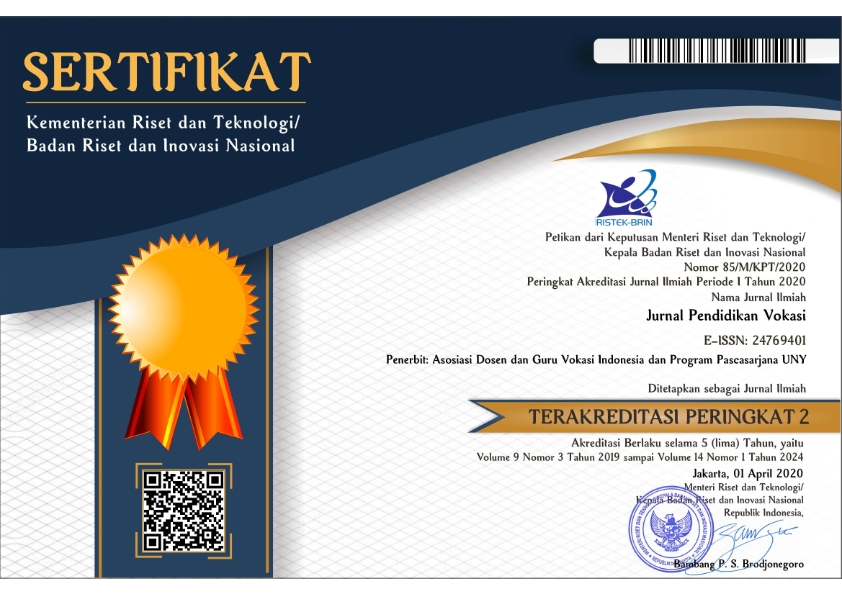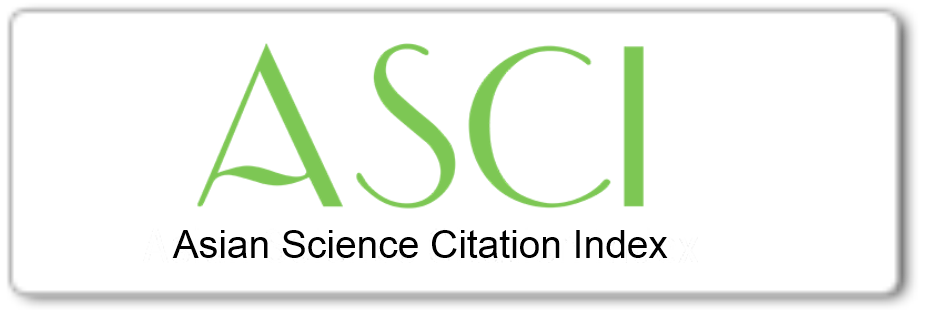Readiness of fashion education and training institutions management in facing the industrial revolution 4.0 and society 5.0
Widihastuti Widihastuti, (Scopus ID: 57210125749) Universitas Negeri Yogyakarta, Indonesia
Nur Kholifah, (Scopus ID: 57200557180) Universitas Negeri Yogyakarta, Indonesia
Sayidatul Maslahah, Universitas Negeri Yogyakarta, Indonesia
Abstract
Keywords
Full Text:
PDFReferences
Afandi, M., Chamalah, E., & Wardani, O. P. (2013). Model dan metode pembelajaran di sekolah. In Perpustakaan Nasional Katalog Dalam Terbitan (KDT) (Vol. 392, Issue 2). https://doi.org/10.1007/s00423-006-0143-4
Bell, S. (2010). Project-based learning for the 21st century: Skills for the future. The Clearing House: A Journal of Educational Strategies, Issues and Ideas, 83(2), 39–43. https://doi.org/10.1080/00098650903505415
Fattah, N. (2001). Landasan manajemen pendidikan (1st ed.). Remaja Rosdakarya. http://perpus.tasikmalayakab.go.id/opac/detail-opac?id=3422
Gie, T. L. (1992). Administrasi perkantoran modern (4th ed.). Liberty. https://opac.perpusnas.go.id/DetailOpac.aspx?id=664536
Hermann, M., Pentek, T., & Otto, B. (2016). Design principles for industrie 4.0 scenarios. 2016 49th Hawaii International Conference on System Sciences (HICSS), 3928–3937. https://doi.org/10.1109/HICSS.2016.488
Kementerian Ketenagakerjaan Republik Indonesia. (2019). Data angkatan kerja 35. Satudata.Kemnaker.Go.Id. https://satudata.kemnaker.go.id/data-angkatan-kerja
Mcgrath, S., & Mulder, M. (2019). Handbook of Vocational Education and Training. In Handbook of Vocational Education and Training. https://doi.org/10.1007/978-3-319-94532-3
Meriza, I. (2018). Pengawasan (Controling) Dalam Institusi Pendidikan. At-Ta’dib: Jurnal Ilmiah Prodi Pendidikan Agama Islam, 10(1), 37–46. http://ejournal.staindirundeng.ac.id/index.php/tadib/article/view/113
Miles, M. B., & Huberman, A. M. (2009). Qualitative data analysis: An expanded sourcebook (2nd ed.). Sage Publications. https://books.google.co.id/books?hl=id&lr=&id=U4lU_-wJ5QEC&oi=fnd&pg=PA10&dq=Qualitative+data+analysis+Miles&ots=kFTH2HVZ1T&sig=ctEW_Fy8_VcHJaSI16_m2hLHAKA&redir_esc=y#v=onepage&q=Qualitative data analysis Miles&f=false
O’Hair, D., Friedrich, G. W., & Dixon, L. D. (2009). Strategic communication in business and professions (6th ed.). Kencana Prenada Media Group.
Rizani, R. (2019). Implementasi privacy shield dalam menggunakan protection of personal data UNI Eropa - Amerika. Jurnal Ilmu Hubungan Internasional, 7(3), 1209–1218. https://ejournal.hi.fisip-unmul.ac.id/site/?p=3049
Salgues, B. (2018). Society 5.0: Industry of the future, technologies, methods and tools (1st ed.). ISTE Ltd and John Wiley & Sons, Inc. https://books.google.co.id/books?hl=en&lr=&id=pO1qDwAAQBAJ&oi=fnd&pg=PP2&dq=Society+5.0,+Industry+of+the+future,+technologies,+methods+and+tools&ots=0H1GToTE8V&sig=I-zJdYeAGTvn6vO9Hj_S3qnJBDk&redir_esc=y#v=onepage&q=Society 5.0%2C Industry of the future%2C technologies%2C methods and tools&f=false
Schwab, K. (2016). The fourth industrial revolution. Crown Business. https://books.google.co.id/books?hl=en&lr=&id=ST_FDAAAQBAJ&oi=fnd&pg=PR7&dq=The+Fourth+Industrial+Revolution+Schwab,+Klaus&ots=DUjz4WyzSP&sig=h1gBSeCU8mtw9dqIM6k3ylZaOgU&redir_esc=y#v=onepage&q=The Fourth Industrial Revolution Schwab%2C Klaus&f=false
Singh, M. (2005). Meeting basic learning needs in the informal sector: Integrating education and training for decent work, empowerment, and citizenship. Springer. https://books.google.co.id/books?hl=en&lr=&id=enBkghBDTGMC&oi=fnd&pg=PR5&dq=Meeting+basic+learning+needs+in+the+informal+sector:+integrating+education+and+training+for+decent+work,+empowerment+and+citizenship+Madhu+singh&ots=zpMM7L7fOK&sig=AiXKRQhpWrsh6mYNPUgN6Psv_gE&redir_esc=y#v=onepage&q=Meeting basic learning needs in the informal sector%3A integrating education and training for decent work%2C empowerment and citizenship Madhu singh&f=false
Sudira, P. (2018). Metodologi pembelajaran vokasional Abad XXI: Inovasi, teori, dan praksis. In B. Lastariwati (Ed.), UNY Press. UNY Press. http://staffnew.uny.ac.id/upload/131655274/penelitian/DOC C 4 Buku Referensi Metodologi Pembelajaran Vokasional Abad XXI Inovasi, Teori, dan Praksis.pdf
Sugiyono, S. (2013). Metode penelitian pendidikan: Pendekatan kuantitatif, kualitatif, dan R & D (17th ed.). Alfabeta.
Syafaruddin, S. (2005). Manajemen lembaga pendidikan Islam (1st ed.). Ciputat Press. http://repository.uinsu.ac.id/2895/1/Manajemen Lembaga Pendidikan Islam.pdf
Syamsi, I., Westra, P., & Sutarto, S. (1982). Ensiklopedi administrasi. Gunung Agung. https://opac.perpusnas.go.id/DetailOpac.aspx?id=658343
Terry, G. R. (1977). Principles of management. IRWIN. https://lib.ui.ac.id/detail.jsp?id=20121801
Thach, E. C., & Murphy, K. L. (1995). Competencies for distance education professionals. Educational Technology Research and Development, 43(1), 57–79. https://doi.org/10.1007/BF02300482
Wijaya, C., & Rifa’i, M. (2016). Dasar-dasar manajemen: Mengoptimalkan pengelolaan organisasi secara efektif dan efisien. Perdana Publishing. http://repository.uinsu.ac.id/2895/1/Manajemen Lembaga Pendidikan Islam.pdf
Winanti, W., Gaol, F. L., Napitupulu, T. A., Soeparno, H., & Trisetyarso, A. (2019). Learning framework in the industrial age 4.0 in higher education. 2018 Indonesian Association for Pattern Recognition International Conference (INAPR), 1, 227–232. https://doi.org/10.1109/INAPR.2018.8627039
Zainal, V. R., Ramly, H. M., Mutis, T., & Arafah, W. (2014). Manajemen sumber daya manusia untuk perusahaan dari teori ke praktik. RajaGrafindo Persada. http://perpustakaan.bppsdmk.kemkes.go.id//index.php?p=show_detail&id=3246
DOI: https://doi.org/10.21831/jpv.v11i3.44094
Refbacks

This work is licensed under a Creative Commons Attribution-ShareAlike 4.0 International License.
Our journal indexed by:
















